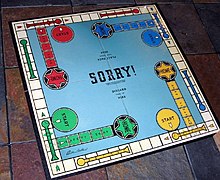Sorry! (game)
 An image of a older Sorry! game board. | |
| Manufacturer(s) | Hasbro |
|---|---|
| Publication date | 21 May 1929[1][2] |
| Players | 2-4 |
| Setup time | 1-5 minutes |
| Skill(s) required | Counting |
Sorry! is a board game that is played between two to four players and their goal is to get all four pawns to their home space. Instead of using dice, they use cards to show what do they mean. If a pawn gets bumped (or captured (but not your own)), it returns to their own start spot. And they are not allowed to have two pawns of their colour on the same space. If you land on a triangle that has a slide sign that contains your own colour on the board, you slide to the circle spot and bump any pawns on the slide (including your own) back to their start spot. If you land on the middle of the slide or a triangle that does not contain you own colour, then you do not slide. If the deck runs out of cards, then shuffle the cards and put them face-down on the “cards here” rectangle spot.
Cards
[change | change source]- 1: Move one of your pawns from the start space or if in play, move one square forward.
- 2: Move one of your pawns from the start space or if in play, move two squares forward.
- 3: Move three squares forward.
- 4: Move four squares backward.
- 5: Move five squares forward.
- 7: Move seven squares forward, or split two pawns that will equal to seven.
- 8: Move eight squares forward.
- 10: Move 10 squares forward, or move one square backward.
- 11: Move 11 squares forward, or swap any enemies' piece on the board (if a pawn is on the start, safety or home space, you cannot swap the pawn in there (and also, if you can’t move 11 squares and you don’t want swap any enemies' pawn, you can lose your turn if you want)).
- 12: Move 12 squares forward.
- Sorry: Move one of your pawns from the start space to bump an enemy's pawn, or move four squares forward.
References
[change | change source]- ↑ "Search for a trade mark – Intellectual Property Office". Intellectual Property Office. Archived from the original on 1 April 2012. Retrieved 30 December 2009.
- ↑ "History". Archived from the original on 4 November 2008. Retrieved 30 December 2009.
